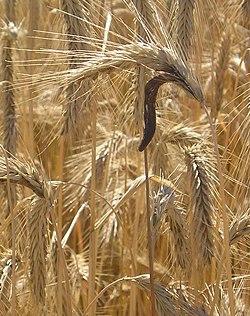Rye ergot fungus
| Claviceps purpurea | |
|---|---|
 |
|
| Claviceps purpurea | |
| Scientific classification | |
| Kingdom: | Fungi |
| Division: | Ascomycota |
| Class: | Sordariomycetes |
| Subclass: | Hypocreomycetidae |
| Order: | Hypocreales |
| Family: | Clavicipitaceae |
| Genus: | Claviceps |
| Binomial name | |
|
Claviceps purpurea (Fr.) Tul. 1853 |
|
| ecological races | |
|
|
Claviceps purpurea is an ergot fungus that grows on the ears of rye and related cereal and forage plants. Consumption of grains or seeds contaminated with the survival structure of this fungus, the ergot sclerotium, can cause ergotism in humans and other mammals.C. purpurea most commonly affects outcrossing species such as rye (its most common host), as well as triticale, wheat and barley. It affects oats only rarely.
An ergot kernel called Sclerotium clavus develops when a floret of flowering grass or cereal is infected by an ascospore of C. purpurea. The infection process mimics a pollen grain growing into an ovary during fertilization. Because infection requires access of the fungal spore to the stigma, plants infected by C. purpurea are mainly outcrossing species with open flowers, such as rye (Secale cereale) and Alopecurus.
The proliferating fungal mycelium then destroys the plant ovary and connects with the vascular bundle originally intended for feeding the developing seed. The first stage of ergot infection manifests itself as a white soft tissue (known as Sphacelia segetum) producing sugary honeydew, which often drops out of the infected grass florets. This honeydew contains millions of asexual spores (conidia) which are dispersed to other florets by insects or rain. Later, the Sphacelia segetum convert into a hard dry Sclerotium clavus inside the husk of the floret. At this stage, alkaloids and lipids (e.g. ricinoleic acid) accumulate in the Sclerotium.
...
Wikipedia
